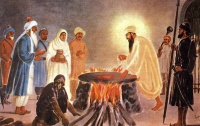Template:AOW18: Difference between revisions
Hari singh (talk | contribs) No edit summary |
Hari singh (talk | contribs) No edit summary |
||
| Line 3: | Line 3: | ||
[[Image:Arjan11.jpg|thumb|200px|left|Guru Arjan Dev's subject to torture by the Mughals.]] | [[Image:Arjan11.jpg|thumb|200px|left|Guru Arjan Dev's subject to torture by the Mughals.]] | ||
On | On [[16 June]] of every year since [[1606]], the [[Sikh]]s have commemorated the martyrdom of their first martyr, the fifth Guru, [[Guru Arjan Dev]]. Sikh history until then had been peaceful and non-violent. | ||
After the death of [[Mughal]] Emperor [[Akbar]] in 1605, his son [[Jahangir]] became the leader of [[India]]. Unlike his father, Jahagir was a fundamentalist [[Muslim]], obsessed with turning the country into an Islamic state. Both Hindu and Muslim fundamentalists concerned at the rapid increase in the popularity of [[Guru Arjan]], moved the new head of state | All the [[Sikh Gurus]] had taught the message of compassion, love, dedication, hard work, worship of one God and the commitment to peace and harmony for all the peoples of the world. During the Guruship of [[Guru Arjan]] many thousands of the native people had began to follow the teachings of [[Sikhism]] and both the [[Hindu]]s and [[Muslim]]s were crowding to [[Govindwal]], the centre of Sikhs during the late 1500's. | ||
After the death of [[Mughal]] Emperor [[Akbar]] in 1605, his son [[Jahangir]] became the leader of [[India]]. Unlike his father, Jahagir was a fundamentalist [[Muslim]], obsessed with turning the country into an [[Islamic]] state. Both [[Hindu]] and [[Muslim]] fundamentalists concerned at the rapid increase in the popularity of [[Guru Arjan]], moved the new head of state [[Emperor Jahangir]] against the Guru. Jahangir himself was also jealous about Guru's propagation of [[Sikhism]]. | |||
He promptly obliged the enemies of the Guru. Many baseless allegations were levelled against Guru Sahib, one of those was helping the rebellious [[Khusrau]], who was Jahangir's son and the preferred choice of Akbar to be the next ruler of [[India]] rather than his son Jahangir, who was given to drinking wine and taking opium. <!---His father thought Jahangir was unfit to rule. But in the war of succession Jahangir had won and Khusrau had managed to hold on to [[Punjab]] alone.---> {{Aowf|Martyrdom of Guru Arjan}} | |||
Latest revision as of 18:12, 15 June 2010
On 16 June of every year since 1606, the Sikhs have commemorated the martyrdom of their first martyr, the fifth Guru, Guru Arjan Dev. Sikh history until then had been peaceful and non-violent.
All the Sikh Gurus had taught the message of compassion, love, dedication, hard work, worship of one God and the commitment to peace and harmony for all the peoples of the world. During the Guruship of Guru Arjan many thousands of the native people had began to follow the teachings of Sikhism and both the Hindus and Muslims were crowding to Govindwal, the centre of Sikhs during the late 1500's.
After the death of Mughal Emperor Akbar in 1605, his son Jahangir became the leader of India. Unlike his father, Jahagir was a fundamentalist Muslim, obsessed with turning the country into an Islamic state. Both Hindu and Muslim fundamentalists concerned at the rapid increase in the popularity of Guru Arjan, moved the new head of state Emperor Jahangir against the Guru. Jahangir himself was also jealous about Guru's propagation of Sikhism.
He promptly obliged the enemies of the Guru. Many baseless allegations were levelled against Guru Sahib, one of those was helping the rebellious Khusrau, who was Jahangir's son and the preferred choice of Akbar to be the next ruler of India rather than his son Jahangir, who was given to drinking wine and taking opium. .....More

